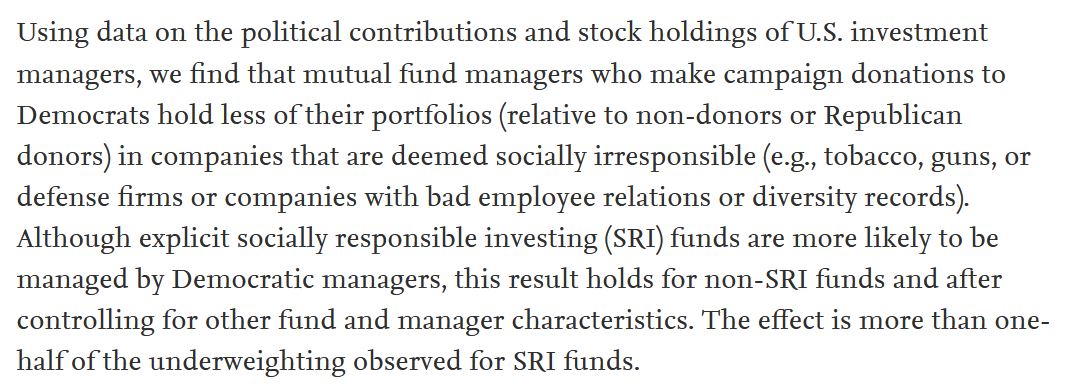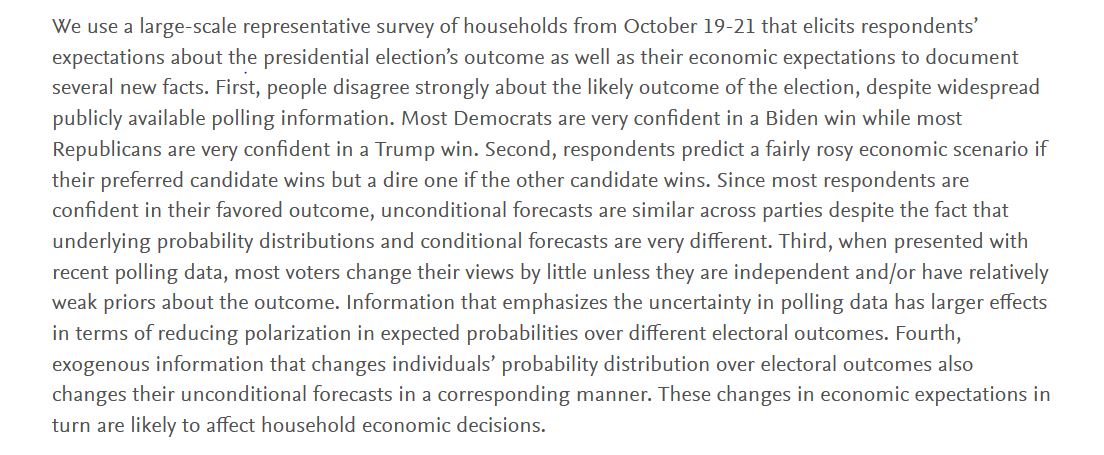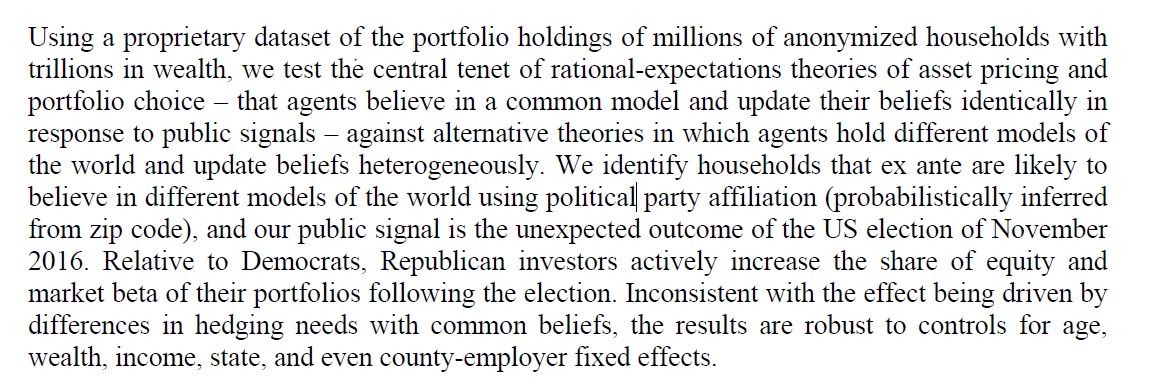
1/ There is surprisingly little discussion about seemingly huge (sorry) stock market trading opportunities coming from political disagreement after the election. This possibility is important from both a practical and a scientific perspective. Here's a first take.
2/ Although Left and Right disagree sharply on almost everything, it seems to me that both will be able to agree that stocks are severely mispriced.
The Left and Right, including financial professionals, have very different ideas about how the world works, ...
The Left and Right, including financial professionals, have very different ideas about how the world works, ...
3/ ...including how politics and the economy work. Prices are set to reflect a weighted average between these beliefs. This implies that from the viewpoint of the Left, there is exploitable mispricing---prices are partly impounding the radically different views of the Right.
4/ Similarly, those on the Right see exploitable mispricing.
For example, consider this Forbes blog entry about a Moody's analysis, entitled "Biden, Democratic Victories Would Be Best Outcome For The Economy, Moody’s Says"
forbes.com/sites/sergeikl…
For example, consider this Forbes blog entry about a Moody's analysis, entitled "Biden, Democratic Victories Would Be Best Outcome For The Economy, Moody’s Says"
forbes.com/sites/sergeikl…
5/ This states: "A victory for Joe Biden over Donald Trump and a Democratic sweep—where Republicans lose the Senate—would result in the biggest rebound in economic growth and employment, according to a recent analysis of both candidates’ economic proposals by Moody’s Analytics.”
6/ It goes on to say that “7.4 million more jobs would be added under Biden than Trump, Moody’s estimates."
Quite likely many on the Left would agree, and many on the Right would disagree.
Quite likely many on the Left would agree, and many on the Right would disagree.
8/ If there is a Democratic sweep, for example, presumably the Left will see a buying opportunity, and the Right will see a selling opportunity. And not a small one! The disagreement is massive and views are strongly held.
9/ There are also sector- and industry-specific trading opportunities. Consider for example the implications for oil and gas (fracking) and coal, or for the healthcare industry.
10/ There are also subtler implications. Behavioral finance theory and evidence suggests that greater disagreement about individual stocks promotes overpricing. This is the disagreement theory of Edward (not Merton!) Miller.
onlinelibrary.wiley.com/doi/10.1111/j.…
onlinelibrary.wiley.com/doi/10.1111/j.…
11/ The Miller argument: suppose that different investors disagree about the prospects of a stock. Suppose further that investors are overconfident about their beliefs--they stick to them stubbornly.
12/ So even though an optimistic may understand that there are others who are pessimistic, and vice versa, they do not update accordingly such that their beliefs converge. I.e., they “agree to disagree.”
13/ Suppose further that investors seldom short sell, as is true for retail investors and even many professionals & institutions. Then when disagreement is high, optimistic investors buy heavily, whereas pessimists sit on the sidelines. So stocks become severely overpriced.
14/ In contrast, when disagreement is low, this effect is minimal.
Evidence for the disagreement effect was provided by Diether, Malloy & Scherbina, using dispersion in analyst forecasts of future earnings as a proxy for disagreement. ssrn.com/abstract=472362
Evidence for the disagreement effect was provided by Diether, Malloy & Scherbina, using dispersion in analyst forecasts of future earnings as a proxy for disagreement. ssrn.com/abstract=472362
15/ Greater disagreement is associated with lower future returns, and the effect does not seem to come from risk.
17/ There are also implications for the mispricing of foreign stocks available for trade by US investors, to the extent that the Left and Right have different views about foreign trade and policy.
18/ And of course, there is disagreement among foreigners as well about the substantial implications of the US election for the economy and markets.
19/ There is also evidence of various source that political ideology does indeed influence how people invest. One example: beliefs about climate change.
https://twitter.com/BrendanNyhan/status/1320759405579702272
20/ In the stock market context, Democratic-donating mutual fund managers invest less than Republican ones "in companies deemed socially irresponsible"--even after excluding socially responsible investing (SRI) funds.
papers.ssrn.com/sol3/papers.cf….
sciencedirect.com/science/articl…
papers.ssrn.com/sol3/papers.cf….
sciencedirect.com/science/articl…

21/ Another study reports that more patriotic regions (both across and within countries) have greater home bias in investment (invest less in foreign stocks).
sciencedirect.com/science/articl…
sciencedirect.com/science/articl…
22/ Furthermore, there is evidence that “left-wing voters & politicians are less likely to invest in stocks” after appropriate controls. This is consistent with left-wing suspicion of or hostility to financial markets.
24/ There is also evidence that political activists are more likely to participate in the stock market. Bonaparte and Kumar (Journal of Financial Economics 2013) suggest that this may be because of their greater exposure to financial news.
sciencedirect.com/science/articl…
sciencedirect.com/science/articl…
25/ By the way, my compliments to the earlier members of the Journal of Financial Economics editorial team (before I joined it) on publishing extensively research on how social processes influence investment and corporate finance behaviors.
26/ Also, contributions by stock analysts to the Republican party are associated with less aggressive forecasts of earnings and stock recommendations.
“Political Contributions and Analyst Behavior” Danling Jiang, Alok Kumar and Kelvin Law
link.springer.com/article/10.100…
“Political Contributions and Analyst Behavior” Danling Jiang, Alok Kumar and Kelvin Law
link.springer.com/article/10.100…
27/ Well that was quick! Soon after posting this thread, there’s this: "Political Polarization & Expected Economic Outcomes," Coibion, Gorodnichenko & Weber
papers.ssrn.com/sol3/papers.cf…
“Most Democrats are very confident in a Biden win while most Republicans... (cont.)
papers.ssrn.com/sol3/papers.cf…
“Most Democrats are very confident in a Biden win while most Republicans... (cont.)

28/ "...are very confident in a Trump win. … respondents predict a fairly rosy economic scenario if their preferred candidate wins but a dire one if the other candidate wins.”
“These changes in economic expectations in turn are likely to affect household economic decisions.”
“These changes in economic expectations in turn are likely to affect household economic decisions.”
29/ Turns out there's another interesting paper in which partisan political beliefs seem to affect how economic expectations respond to elections. Awkwardly entitled "Belief Disagreement and Portfolio Choice." Meeuwis, Parker, Schoar & Simester
papers.ssrn.com/sol3/papers.cf…
papers.ssrn.com/sol3/papers.cf…

30/ They study how the surprise victory of Donald Trump in the 2016 presidential election affected households with different party affiliations. More than Dems, "Republican investors … increase[d] the equity share & market beta of their portfolios following the election."
• • •
Missing some Tweet in this thread? You can try to
force a refresh


